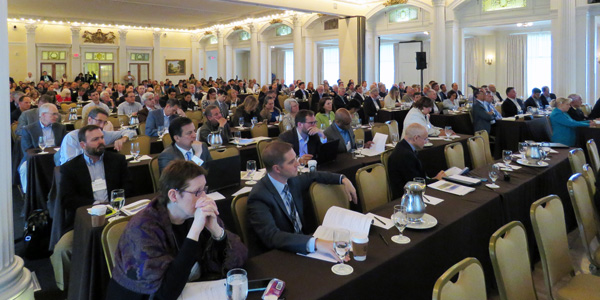By Rich Heidorn Jr.
CARROLL, N.H. — Acting FERC Chair Cheryl LaFleur expressed relief Monday that the restoration of the commission’s quorum is within sight.
“What we know for sure is we’ll have a different FERC at the end of 2017 than we did going into the year,” LaFleur told the New England Conference of Public Utilities Commissioners’ (NECPUC) 70th Annual Symposium at the Omni Mount Washington Resort.
The Senate Energy and Natural Resources Committee is scheduled to vote June 6 on approving nominees Robert Powelson and Neil Chatterjee to two Republican vacancies on the commission. The committee questioned the two nominees at a mostly cordial hearing May 25. (See No Fireworks for FERC Nominees at Senate Hearing.)
In addition, LaFleur said, there are “rumblings” that Trump will name a Democrat to replace Commissioner Colette Honorable along with a third Republican nominee.
The five-member commission has been without a quorum since February, when then-Chairman Norman Bay resigned after President Trump stripped him of the chairmanship and promoted LaFleur.
LaFleur said the commission has issued only a fraction of the 100 commission-authorized orders it averages a month. Without a quorum, FERC staffers have been able to issue only delegated orders. Contested dockets and rulemakings have been at a standstill.
“So we are piling up quite a few cases for potential voting when [new] folks come in,” LaFleur said. “On some of these bigger policy issues … it’s not a matter of striking up an order. We’re looking to shape the policy choices in as transparent a way as possible for the incoming commissioners.
“We do have several dozen open rulemakings or generic dockets … multiple rulemakings on price formation in the electric markets, interconnection rules, [the Public Utility Regulatory Policies Act], hydro licensing terms, taxation [and] master limited partnerships in the pipeline area are some of the big ones that come to mind.
“But nothing’s higher on the mind than the issue du jour of harmonizing wholesale market rules and state policy initiatives,” she added, citing an issue that was the subject of a two-day technical conference in May. (See RTO Markets at Crossroads, Hobbled FERC Ponders Options.)
LaFleur said Trump’s decision to pull the U.S. from the Paris Agreement “could only accelerate the extent to which climate policy is increasingly being made in the states.” More than a dozen states — including Connecticut, Massachusetts, Rhode Island and Vermont in New England — have joined the U.S. Climate Alliance, with pledges to meet the Paris commitments on carbon emission reductions. (See related story, Trump Pulling U.S. Out of Paris Climate Accord.)
“There always seems to be one topic that sucks a lot of the air out of the room. I remember back when it was integrated resource planning and whether it worked. When I first came to FERC it was demand response,” she said. “Well now it’s this. … I do think this is one of the bigger things that FERC will be facing when FERC reconstitutes itself.”
Powelson, a member and former chair of the Pennsylvania Public Utility Commission, is the current president of the National Association of Regulatory Utility Commissioners. Chatterjee, of Kentucky, is a senior energy policy adviser to Senate Majority Leader Mitch McConnell (R-Ky.).
Assuming the nominees clear the committee vote, how soon they join the commission will be dependent on when their nominations are scheduled for a Senate floor vote.
The commission canceled its open meeting for June 20, as it has all previous meetings since February. The July 20 meeting is still listed on FERC’s calendar.
LaFleur repeated her promise to remain on the commission until the expiration of her term in June 2019.
“I’m very optimistic that we will keep the bipartisan and collegial tradition that has really characterized the commission. I think cultures are slow to change. There’s a lot of swirl in Washington right now, but I believe that FERC is very strong.”






